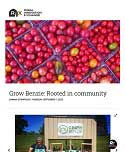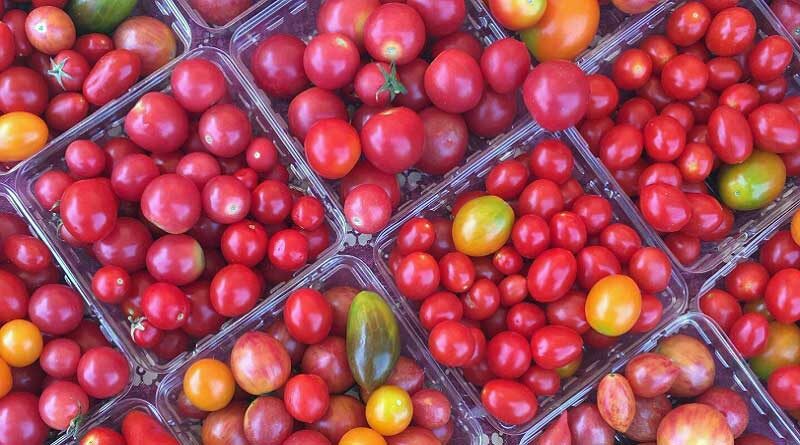Grow Benzie: Rooted in Community

By Dianna Stampfler
Josh Stoltz was fortunate to have spent his youth exploring the rural countryside of Benzie Country, where agriculture has been rooted for generations.
After graduating from Benzie Central High School and Central Michigan University (majoring in Broadcasting and Cinematic Arts, with a double minor in Marketing and Advertising), this entrepreneur spread his wings across the country working in Arizona, Florida and New York before finding his way back home.
And while luck may have played a role in where Josh was born and raised, returning to northwest Michigan was conscious decision which has led to a blossoming career within the ever-growing agri-tourism industry.
In the late 1800s, the Lake Michigan coastal region was dubbed the “fruit belt” given the abundance of orchards and farms that operated within proximity to the third largest Great Lake. That moniker remains as relevant today, as a new generation of farmers, growers and collaborators plant seeds for the future.
Stoltz is one of those industry leaders. In 2014, he was hired as Executive Director of Grow Benzie, a non-profit based in the village of Benzonia dedicated to enriching the region “by fostering positive activity that increases access to healthful foods, jobs, life skills and each other while providing a space that nurtures this activity.”
That space was the abandoned four-acre Chippewa Farms at 5885 Frankfort Highway (M-115), just west of US-31, which was purchased in 2008 to serve as the campus for a continually evolving community garden and homestead facility.
The first project volunteers tackled was converting a 3,200-square-foot house into commercial spaces dedicated to lost hobbies and professions, like sewing. Today, sewers of all ages and abilities can drop in and utilize one of half-dozen new Husqvarna sewing machines donated by the St. Ann’s Church Men’s Club.
This Sewing Studio houses two distinct programs: Days for Girls of Benzie County (a local chapter of a national non-profit that creates reusable feminine hygiene kits for girls and women overseas) and FiberShed, which offers public year-round sewing workshops lead by volunteers, utilizing donated fabrics and clothing to avoid depositing them into landfills.
A unique and underutilized Stuff Library allows residents to check out a variety of garden tools and appliances or books on topics like organic farming, permaculture, homesteading, beekeeping and more. There’s also a Seed Library where people can donate or take packets of seeds to be planted in their own personal gardens, run by (what else) a Seed Guild – a network of seed savers who not only exchange but educate about botany and tips for collecting seeds for future use.
Early on, Grow Benzie established garden plots for 20 area residents and over time have enhanced its outdoor spaces to include a pollinator garden, bee apiary, a grassy picnic area and a quarter-mile accessible edible trail with lavender, sage, creeping thyme, mint and basil donated from Pleasanton Valley Greenhouses.
“The edible walking trail was established under a capital grant from Rotary Charities of Traverse City to encourage more flow through the campus,” says Gaia Pampu, systems resource manager at Grow Benzie. “There is a lot of work to be done around the property, but our volunteers have been incredible and have worked with me to plant over 100 sunflower seedlings around campus that are now in bloom in a newly established bed next to the bee yard.”
There are also three hoop houses, allowing for year-round growing. During the pandemic, these structures were neglected and fell into a state of disrepair. Thanks to a recent $15,000 Community Impact Grant from the United Way of Northwest Michigan, they are being reskinned and put back into operation.
The fruits (and vegetables) of farmers’ labor are offered up at weekly Community Markets (Wednesdays from 2-6 pm through the end of September) featuring locally harvested produce, artisan crafts and free “Discover Michigan Fresh” cooking demonstrations hosted by Michigan State University (MSU) Extension to introduce families to local farmers and teach them how to utilize in-season produce to develop healthy meals at home.
By accepting WIC, Senior Project Fresh, Double Up Food Bucks and Bridge Card services as well as Munson Rx Coins for Benzie County residents enrolled in the Fruit and Vegetable Prescription Program, the produce becomes more affordable to lower income residents.
“Grow Benzie is an incredible community resource. Josh and his team work tirelessly to connect existing programs with community members that need them most,” says Michelle Barefoot, executive director of the Benzie Area Chamber of Commerce.
A focal point of the campus is the 3,000-square-foot handicap-accessible Event Center (affectionately referred to as Big Blue) which can be rented for fundraisers, concerts, weddings and meetings (up to 200). On the south end of this building is a 1,500-square-foot licensed commercial kitchen which was put into operation in July 2013.
“Having a large, commercial kitchen space in the community is perfect for hosting cooking classes for adults who struggle with food security and to film short cooking videos to help our neighbors learn different ways of preparing food,” says Caitlin Lorenc, a community nutrition instructor for MSU Extension.
This commissary or incubator kitchen, certified by the state of Michigan and Benzie County Health Department, is also open to local producers, food trucks and caterers with current vendors like Mel & Fell, Roll Model, Cold Creek Farm, Soul Food Catering and Off the Hook Tacos using the space to create their various recipes and menus.
“There are so many important organizations and resources in the local food and agriculture space in Michigan. However, navigating this landscape for a new or developing food business can be overwhelming,” says Tricia Phelps of Taste the Local Difference. “TLD relies on community organizations like Grow Benzie to understand the network of resources that exist and provide a tangible connection to new entrepreneurs or interested consumers in their region. We’re grateful for spaces like Grow Benzie where folks can feel supported and connected while developing their business or personal interest in local food.”
Throughout Michigan, the interest in agriculture, agri-tourism and food production has accelerated in recent years resulting in a $104 billion a year industry. Retail stores, restaurants and online outlets are focused on local more than ever and that provides countless opportunities for those with a tasty idea they want to bring to market. But its so much more than that.
“Grow Benzie touches each part of the food system by growing fresh food, distributing it and using it to create delicious meals and helping entrepreneurs start their businesses,” says Noelle Nachreiner, director of the Michigan Ag Council. “This kind of model isn’t just great for agriculture, it’s creating jobs and teaching life skills that will positively impact so many industries across the state, from food service to tourism and economic development.”
At the heart of everything here is partnership and collaboration, with several local organizations utilizing the spaces, sharing services and working to provide a better community including Frankfort-Elberta and Benzie Central School systems, Benzie Area Christian Neighbors, Munson Healthcare and Groundwork Center for Resilient Communities as well as resident-driven groups like the Art Guild and Benzie Bee Guild.
“Grow Benzie represents collaboration at its best,” says Janice Benson, executive director of the Michigan Agritourism Association. “Since its earliest beginnings, it has grown and evolved to meet local needs through its community market and gardens, youth mentorship and volunteer programs, incubator kitchen, beekeeper guilds, seed savers and more. It is a model for the agritourism industry, drawing visitors to its welcoming space, providing opportunities for education and partnering with others all along the way. It has truly made a positive impact in this region and this state.”
While Grow Benzie has racked up an extensive success record since its founding, there are so many more opportunities to keep it a viable contributor to the various communities – farmers, businesses, organizations and families – that it serves.
“[We are] a leader in systems thinking – working across sectors to address complex challenges on a local level,” Pampu says. “We’re very proud of the shared service and business support we provide for smaller grassroots organizations and the backbone support we provide for larger collaborative bodies and networks. It’s incredible to see how these networks of support branch out and organically connect with each other to spark new initiatives, ideas and innovative concepts.”
Stoltz is currently leading his team (staff, board and community leaders) in long-term strategic planning, which is expected to be complete by the fall of 2023.
“One of the biggest takeaways from the process is that organizations from all sectors are hungry for stronger, long-term collaborations,” he says. “Since there are no organizations leading this change, we’ve been filling the gap in the meantime and are excited to have marching orders and goals detailed in a plan.”
Operating a large community agricultural entity such as Grow Benzie requires a wealth of giving – whether that’s the donation of goods, time or money. Stoltz says mulch and new garden tools are always top of the list. As for services, there are projects as simple as weeding and painting to larger construction installations.
On the financial side, Grow Benzie relies on grants and donations to supplement its $150,000 annual operating budget. One large investment would be the purchase of a 38.5-acre mixed used property – with a $420,000 price tag – adjacent to the current Grow Benzie campus.
“This was added to the wish list in hopes of attracting a funder(s) who understands the importance of community building and connecting systems on a local level,” Stoltz says. “With the right people around the table, we can expand local food production, entrepreneurship and food education all while providing innovative housing solutions for our county.”
Dianna Stampfler has been writing professionally since high school. She is the president of Promote Michigan and the author of Michigan’s Haunted Lighthouses and Death & Lighthouses on the Great Lakes, both from The History Press.

